I have always been a big Alfred Hitchcock fan and "North by Northwest" was in my view his most entertaining and important film. It certainly rates a high position in my "Top Ten" films list!! This is a fast moving witty thriller that never lets up in its 130 minutes running time. The film is in beautiful Technicolor and Cary Grant gives the performance of a lifetime as Roger O. Thornhill being mistaken for government agent George Kaplan. He is thrust into one life threatening situation after another on the run from both the police and the bad guys! It's a roller coaster ride of thrills, suspense, comedy and romance skilfully put together with the expert Hitchcock touch. There are so many MEMORABLE LINES in this movie (brilliantly written by Ernest Lehman) that one hardly knows where to start in recalling favourite gems.
How about Jessie Royce Landis in the hotel elevator asking the would-be assassins: "You gentlemen aren't really trying to kill my son are you?".
Or when Grant meets James Mason for the first time: Mason: "Not what I expected - a little taller, a little more polished than the others". Grant: "I'm so glad you're pleased Mr Townsend". Mason: " ... but I'm afraid just as obvious". Grant: "Not that I mind a slight case of abduction now and then but I do have tickets to the theatre tonight and it was a show I was looking forward to and I get, well, kind of unreasonable about things like that". Mason: "With such expert play-acting you make this very room a theatre".
Grant (to group in Townsend's house): "What a performance!". Jessie Royce Landis (to Grant): "Roger ... pay the two dollars". Or Cary Grant trying to explain to Eva Marie Saint why the police are after him: "Seven parking tickets!". Grant introducing himself to Saint on the train: "Jack Phillips. Western sales manager of Kingby Electronics". Saint: "No you're not. You're Roger Thornhill of Madison Avenue and you're wanted for murder on every front page in America. Don't be so modest!". Grant to Saint: "Why are you so good to me?". Malcolm Atterbury (to Grant on Highway 41): "That's funny, that plane's dusting crops where there ain't no crops". Grant to Mason: "Apparently the only performance that's going to satisfy you is when I play dead". Mason: "Your very next role. You will be quite convincing, I assure you". Grant (to Adam Williams): "Sorry old man. Too bad. Keep trying!". Grant (to Leo G. Carroll): "I'm an advertising man, not a red herring. I've got a job, a secretary, a mother, two ex-wives and several bartenders dependent on me and I don't intend to disappoint them all by getting myself slightly killed. The answer is no". Mason discussing how to get rid of Saint: "This matter is best disposed of from a great height - over water!". And Mason again to a police officer: "That wasn't very sporting, using real bullets". "North by Northwest" was Cary Grant's fourth collaboration with legendary director Alfred Hitchcock and in my opinion was the best! Everything came together in this one - the acting by the principals was first class, the brilliant script by Ernest Lehman was packed with sparkling and witty dialogue and the music score by Bernard Hermann was outstanding. There were some fine supporting roles in the film - Jessie Royce Landis was excellent as Grant's mother (in reality she was only a few months older than him!). She had played Grace Kelly's mother in an earlier Hitchcock film "To Catch a Thief". Martin Landau (in his first screen role), Adam Williams and Robert Ellenstein were impressive as Mason's sinister and threatening confederates. Veteran actor Leo G. Carroll was making his sixth appearance for Hitchcock as the CIA/FBI agent known only as the "Professor". One of my favourite actresses Doreen Lang had the small part of Grant's secretary Maggie and can also be seen in other Hitchcock films such as "The Wrong Man" and "The Birds". "North by Northwest" returned to Hitchcock's favourite theme of the innocent man on the run from both the villains and the police and being trapped in one tight corner after another. There were some marvellous and professionally photographed Hitchcock set pieces in unusual locations such as the United Nations Building, New York's Grand Central Station, Mount Rushmore, and who can forget the famous crop dusting sequence at Prairie Stop on deserted Highway 41. (Incidentally, it was on this very same road that James Dean had his fatal car accident in 1955). Other Alfred Hitchcock films using the "man on the run" idea were notably "The 39 Steps" (1935) and "Saboteur" (1942). "North by Northwest" was one of Hitchcock's own favourites as he explained to me in a personal letter I received from him back in the sixties when he listed his own six favourite films. Surprisingly, "North by Northwest" did not win any Oscars and Hitchcock, Cary Grant and the film itself were not even nominated which in my opinion was a regrettable oversight! It is not generally known that James Stewart was very keen to play the part of Roger Thornhill in this film and constantly pestered Hitchcock for the role having starred in four of Hitchcock's previous films. Hitchcock had Cary Grant in mind from the very beginning but did not want to upset Stewart by refusing him outright! However, when James Stewart was cast in "Anatomy of a Murder" that gave Hitchcock the opportunity to sign Grant - the actor he had wanted all along - and who, in retrospect, was the ideal actor for the role. It had been said that Hitchcock thought that Stewart looked too old for the part but he was in actual fact four years younger than Grant!!
The following may contain SPOILERS so only read on if you have seen the film.
Although "North by Northwest" is one of my favourite Hitchcock films I have been baffled and amazed by the number of mistakes, errors and goofs that were allowed to get through in the finished print! For example at the very start of the film when Cary Grant and his secretary Maggie arrive at the Plaza Hotel in New York a car can be seen through the rear window of their taxi which is bright orange. When Grant leaves the taxi the car behind is a completely different make and colour. As the taxi pulls away the secretary has apparently disappeared from the back seat. When Grant and his mother are in Kaplan's hotel room the telephone has a coiled cord but when Grant uses the phone a couple of minutes later it is straight. In the stabbing scene at the United Nations Grant pulls the knife from Townsend's back with the blade pointing down but in the very next shot he is holding the knife upright. When Grant is photographed at the United Nations Building with the knife in his left hand he is holding a newspaper cutting in his right hand. Later when this photograph is seen at the ticket seller's office in Grand Central Station his right hand is empty. In the train dining car the flowers on the table change size and shape in each shot and when Grant picks up his wine glass it keeps jumping from his hand to the table. On Highway 41 when the bus picks up Malcolm Atterbury the bus driver slams the door in Grant's face before waiting to see if Grant was boarding the bus. In the crop dusting scene when Grant runs out of the cornfield dust can be seen on his shoulders but there is no dust on them when he falls under the truck. In Eva Marie Saint's hotel room she writes a message on a pad. After she leaves the room Grant rubs a pencil over the pad to reveal the message that had been on the next sheet. He rubs in a horizontal motion left to right but when the message is shown in close up the impression is vertical up and down. In the Chicago patrol car the policeman sitting next to Grant (Ken Lynch) forgets to lean as the car simulates a turn. Grant can be seen pushing him to one side. During the scene in the restaurant at Mount Rushmore one of the extras (a young boy) can be seen covering his ears BEFORE Eva Marie Saint fires the gun at Grant. He had his back to the camera but obviously knew there would be a loud bang from previous "takes". When Grant is taken away by ambulance at Mount Rushmore after the shooting the vehicle transporting him has only one rear opening door. When he arrives in the forest to meet Eva Marie Saint it has two doors. After escaping from the hospital at Rapid City Grant takes a taxi to James Mason's mountain hide-out. How did he know the address? He had never been there and it had not been mentioned before. At Mason's hide-out Grant is in Saint's room writing a message in a book of matches to warn her of danger. The matchbook is only half full of matches. When Saint picks up the matchbook and reads the message it is now completely full. Also Grant writes the message in three lines but when Saint reads it the message takes up four lines. In the final scenes on Mount Rushmore Saint slips and tears Grant's right back trouser pocket. In later scenes it is intact.
Having identified all these errors please let me assure you that "North by Northwest" still remains one of my favourite films of all time. I only pointed them out as a matter of interest and for your enjoyment in spotting them for yourself next time you see the film. I never caught on to any of these mistakes the first time I saw the film on the big screen. It is only through many repeated viewings on TV and on DVD that they became apparent.
There have been several good books written about Alfred Hitchcock (and I have many of them) but for a good read I can recommend "It's Only a Movie" by Charlotte Chandler and an excellent reference guide is "The A-Z of Hitchcock" by Howard Maxford.
NORTH BY NORTHWEST
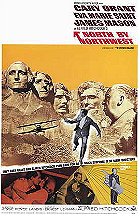 Posted : 16 years, 10 months ago on 20 July 2008 09:41
(A review of North by Northwest)
Posted : 16 years, 10 months ago on 20 July 2008 09:41
(A review of North by Northwest) 0 comments, Reply to this entry
0 comments, Reply to this entry
THE SCORE
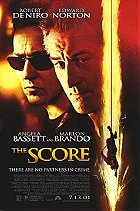 Posted : 16 years, 10 months ago on 20 July 2008 08:59
(A review of The Score)
Posted : 16 years, 10 months ago on 20 July 2008 08:59
(A review of The Score)Robert De Niro is on top form as Nick Wells, a professional thief well past his prime who is reluctantly persuaded to do "one last job" robbing Montreal's Customs House of a priceless sceptre which will set him up for life. His associate Max (Marlon Brando) finances the operation and introduces him to Jack Teller (Edward Norton) who is working as a janitor at the Customs House and can provide vital "inside" information. Jack is posing as Brian - a likeable and apparently half witted disabled young man who is not as simple as he seems. The actual robbery sequence is outstanding with many twists and turns as De Niro tries to break into a secure basement with state of the art cameras, closed circuit TV, lasers, iron cages and one of the most burglar proof safes imaginable. It would appear that these are almost impossible odds but this is what makes the film so enjoyable. Edward Norton is amazing as Jack Teller (and Brian) giving a superlative performance and easily holding his own against experienced actors Brando and De Niro. One of the best heist movies in years. Directed by Frank Oz and (uncredited) Robert De Niro. This was Marlon Brando's last film. The part of Nick Wells was originally offered to Michael Douglas who turned it down and Ben Affleck refused the part of Jack Teller.
 0 comments, Reply to this entry
0 comments, Reply to this entry
BAD DAY AT BLACK ROCK
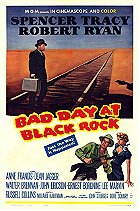 Posted : 16 years, 10 months ago on 20 July 2008 08:30
(A review of Bad Day at Black Rock)
Posted : 16 years, 10 months ago on 20 July 2008 08:30
(A review of Bad Day at Black Rock)"Bad Day at Black Rock" is a riveting suspense thriller with several memorable performances from a first rate cast. Spencer Tracy (in one of his best roles) excels as John J. MacReedy who is in Black Rock to take a medal to the father of one of his wartime colleagues now that the war is over. He encounters unexpected resentment and hostility from some of the residents, in particular from Robert Ryan, Ernest Borgnine and Lee Marvin who make a trio of formidable villains. When threats and intimidation have no effect on Tracy (who doggedly continues his investigations) the three men resort to violence. Also in the impressive cast are Anne Francis (I mentioned this film to her some years back when I met her in Hollywood), Walter Brennan, Dean Jagger, John Ericson and Russell Collins. With the help of Brennan and Francis and after surmounting many obstacles Tracy eventually gets the upper hand bringing the film to its exciting climax. A brilliant and satisfying film expertly directed by John Sturges who later went on to direct other classics including "Gunfight at the O.K. Corral", "The Magnificent Seven" and "The Great Escape". Sturges was fortunate in having such a remarkably talented cast - Borgnine and Marvin in particular were excellent as Robert Ryan's menacing henchmen and Spencer Tracy was at his peak in one of his most powerful and demanding roles ever. He was in fact nominated as Best Actor for his performance in this film but was beaten by Ernest Borgnine for "Marty".
Favourite lines:
Spencer Tracy (to train conductor): "Oh, I'll only be here for 24 hours". Train conductor: "In a place like this that could be a lifetime!".
Russell Collins (to Spencer Tracy): "Important? It's the first time the streamliner has stopped here in four years".
Spencer Tracy (to Ernest Borgnine): "You're not only wrong - you're wrong at the top of your voice!".
John Ericson (to Spencer Tracy): "If you're in such a hurry you should never have got off here". Tracy: "I'm inclined to agree with you".
Favourite lines:
Spencer Tracy (to train conductor): "Oh, I'll only be here for 24 hours". Train conductor: "In a place like this that could be a lifetime!".
Russell Collins (to Spencer Tracy): "Important? It's the first time the streamliner has stopped here in four years".
Spencer Tracy (to Ernest Borgnine): "You're not only wrong - you're wrong at the top of your voice!".
John Ericson (to Spencer Tracy): "If you're in such a hurry you should never have got off here". Tracy: "I'm inclined to agree with you".
 0 comments, Reply to this entry
0 comments, Reply to this entry
THE BIG CLOCK
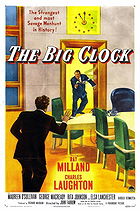 Posted : 16 years, 10 months ago on 18 July 2008 07:15
(A review of The Big Clock)
Posted : 16 years, 10 months ago on 18 July 2008 07:15
(A review of The Big Clock)It has always been a real pleasure to me to rediscover obscure films from years ago which are still of interest today and "The Big Clock" (1948) falls nicely into that category. At the start of this gripping thriller we find Ray Milland hiding in the "Big Clock" of the title wondering to himself how he ever got involved in murder and deception when he is just a hard working married man devoted to his wife, family and career and completely innocent of any crime. As was usual in forties films of that time we now go into a lengthy flashback which explains everything. "The Big Clock" had an exemplary cast including Charles Laughton (superb), Maureen O'Sullivan, George Macready, Harry Morgan, Lloyd Corrigan, Philip Van Zandt, Richard Webb, Dan Tobin and an excellent cameo role by Elsa Lanchester as Louise Patterson, an eccentric artist who plays a significant part in the unfolding drama. The film was directed by John Farrow who also made "Where Danger Lives" (1950) and "His Kind of Woman" (1951) (both with Robert Mitchum). Maureen O'Sullivan is of course best known for her role as "Jane" in the Johnny Weissmuller Tarzan films. She is married to John Farrow (director of "The Big Clock") and one of her daughters is of course Mia Farrow. Charles Laughton was a very distinguished British actor who appeared in many prominent films including one of my favourites - "Witness for the Prosecution" (1957). He only directed one film during his career which was the splendid "Night of the Hunter" in 1955. Ray Milland (Reginald Truscott Jones was his real name!) deservedly won the Best Actor Oscar for "The Lost Week-end" (directed by Billy Wilder in 1945). Charles Laughton and Elsa Lanchester were married during the making of this film as were director John Farrow and Maureen O'Sullivan.
Favourite lines:
Ray Milland: "More guards, the lobby's sewed up like a sack - and they said shoot to kill. They mean you George, you. How'd I get into this rat race anyway, I'm no criminal - what happened - when did it all start?".
Elsa Lanchester (when Ray Milland outbids her on a painting): "Isn't it a pity ... the wrong people always have money".
Elsa Lanchester (to Milland): "Never mind Mr Stroud, I've few enough collectors without sending one to jail".
Favourite lines:
Ray Milland: "More guards, the lobby's sewed up like a sack - and they said shoot to kill. They mean you George, you. How'd I get into this rat race anyway, I'm no criminal - what happened - when did it all start?".
Elsa Lanchester (when Ray Milland outbids her on a painting): "Isn't it a pity ... the wrong people always have money".
Elsa Lanchester (to Milland): "Never mind Mr Stroud, I've few enough collectors without sending one to jail".
 0 comments, Reply to this entry
0 comments, Reply to this entry
THE WOMAN IN THE WINDOW
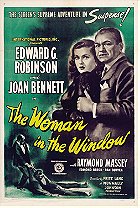 Posted : 16 years, 10 months ago on 18 July 2008 06:36
(A review of The Woman in the Window)
Posted : 16 years, 10 months ago on 18 July 2008 06:36
(A review of The Woman in the Window)"The Woman in the Window" has a gripping storyline with lots of surprises along the way and edge of your seat suspense. Edward G. Robinson gives a first rate performance in the film which was made the same year that he starred in Billy Wilder's "Double Indemnity" (1944). To have two great parts such as these in the same year was a remarkable achievement but Robinson was a talented actor and played a large variety of roles in a long and successful career. He started out at Warner Bros. in typical gangster roles (along with Bogart and Cagney) but by the 40s had branched out into other more satisfying characterisations. In "The Woman in the Window" he was outstanding as Professor Richard Wanley and received excellent support from Joan Bennett as the seductive Alice Reed. Dan Duryea was suitably menacing as the villainous Heidt and Raymond Massey played Robinson's friend District Attorney Frank Lalor. The film was powerfully directed by Fritz Lang with a marvellously unexpected surprise twist at the end. The success of this film encouraged director Fritz Lang to reunite with the same three leading players the following year for another classic thriller "Scarlet Street".
Favourite lines:
Joan Bennett (to Edward G. Robinson): "I'm not married. I have no designs on you and one drink is all I care for".
Raymond Massey (to Robinson): "It's all right Richard - don't get excited. We rarely arrest people for just knowing where the body was".
Favourite lines:
Joan Bennett (to Edward G. Robinson): "I'm not married. I have no designs on you and one drink is all I care for".
Raymond Massey (to Robinson): "It's all right Richard - don't get excited. We rarely arrest people for just knowing where the body was".
 0 comments, Reply to this entry
0 comments, Reply to this entry
OUT OF THE PAST
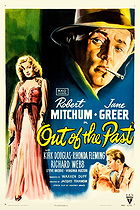 Posted : 16 years, 10 months ago on 18 July 2008 11:01
(A review of Out of the Past (1947))
Posted : 16 years, 10 months ago on 18 July 2008 11:01
(A review of Out of the Past (1947))This was the movie that first made me aware of "film noir" although in those days they were just known as thrillers and nothing more than that. Over the years these black and white movies have gathered a cult following. "Out of the Past" stars Robert Mitchum and the gorgeous Jane Greer. It is a sordid tale about former private detective Jeff Markham (Robert Mitchum) trying to escape his unsavoury past by running a gas station under a new name (Bailey). He wants to forget all about disreputable thug Whit Sterling (Kirk Douglas in an early role) who hired him to find double dealing femme fatale Kathie Moffat (Jane Greer) after she had stolen $40,000 from him and disappeared. Greer's ravishing first appearance in the film wearing a white dress and a matching white hat is breathtaking. Bailey makes the mistake of falling for Kathie in a big way before she involves him in treachery and murder. As was quite common in 40s films at the time there was a long flashback sequence to explain Mitchum's predicament. Jane Greer apparently loved working with Mitchum and is quoted as saying that he was wonderful and most helpful to her during the shooting of the film. In 1949 she again worked with Robert Mitchum in "The Big Steal" and allegedly only landed this part because both Lizabeth Scott and Joan Bennett had turned it down. Following these two films Jane Greer became one of RKO's leading actresses and was under exclusive contract to Howard Hughes. Unfortunately Hughes had a personal obsession about her and when she married Edward Lasker (whom Hughes disliked) he refused to put her into any more pictures which resulted in Jane having to buy herself out of her contract for $11,000. Also featured in "Out of the Past" were Rhonda Fleming, Steve Brodie, Richard Webb, Virginia Huston, Paul Valentine and Dickie Moore (who later married Jane Powell). The film was expertly directed by Jacques Tourneur. When the film was first released in the U.K. it was called "Build My Gallows High" which was the title of the original best selling novel by Geoffrey Homes. The role of Jeff Bailey was turned down by both Dick Powell and John Garfield before being offered to Mitchum. Humphrey Bogart read the script and was very keen to play Jeff Bailey but as he was under contract to Warner Bros. and it was an RKO film he didn't get his wish! "Out of the Past" is a classic "film noir" which can still be enjoyed today. Mitchum and Greer made a perfect screen team and were at their very best in this film.
Favourite lines:
Kirk Douglas to Robert Mitchum: "I know a lot of smart guys, and a few honest ones. You're both".
Mitchum to Douglas: "You liked me because you could use me. You could use me because I was smart. I'm not smart anymore. I run a gas station".
Favourite lines:
Kirk Douglas to Robert Mitchum: "I know a lot of smart guys, and a few honest ones. You're both".
Mitchum to Douglas: "You liked me because you could use me. You could use me because I was smart. I'm not smart anymore. I run a gas station".
 0 comments, Reply to this entry
0 comments, Reply to this entry
RED ROCK WEST
 Posted : 16 years, 10 months ago on 17 July 2008 04:02
(A review of Red Rock West (1993))
Posted : 16 years, 10 months ago on 17 July 2008 04:02
(A review of Red Rock West (1993))"Red Rock West" is a superb and well written thriller with excellent acting and surprises galore. The plot twists and turns and keeps you on the edge of your seat throughout. Nicolas Cage plays Michael Williams who arrives in Red Rock broke and out of work when he is mistaken for a contract killer. Bar owner Wayne Brown (J. T. Walsh) offers him $10,000 to murder his wife. Williams is shocked but pretends to go along with the plan. He decides to warn Brown's wife Suzanne (Lara Flynn Boyle) of her husband's evil intentions but this is where things start to go drastically wrong. The real killer, Lyle (played by Dennis Hopper) then arrives in town which places Williams in many dangerous situations but you will have to see the film to discover just what happens to him next!! "Red Rock West" is a film which did not receive much publicity on its release but is now gaining a cult following. This is definitely a film worth looking out for with a marvellous storyline and many unexpected surprises along the way. J. T. Walsh gave a riveting performance in the film - he had long been one of my favourite character actors and it is tragic that we lost him to a fatal heart attack in 1998. I had enjoyed his exceptional work in many films including "Breakdown", "The Narrow Margin", "A Few Good Men", "Backdraft", "The Client", "Good Morning, Vietnam", "Things Change", "The Grifters", "House of Games", "Pleasantville" and several others. A sad loss. "Red Rock West" was directed (and co-written) by John Dahl who also made another fine film "The Last Seduction" (1994). I plan to watch out for more of his films in the future. "Red Rock" is certainly a surprise hit - one of the best thrillers of the 90's. Do yourself a favour and see it!
Favourite lines:
Nicolas Cage to Lara Flynn Boyle: "I hate to see an innocent woman get hurt but it's an awful lot of money."
Boyle to Cage: "O.K. How are you going to explain impersonating a hired killer and taking $10,000 from my husband?".
Favourite lines:
Nicolas Cage to Lara Flynn Boyle: "I hate to see an innocent woman get hurt but it's an awful lot of money."
Boyle to Cage: "O.K. How are you going to explain impersonating a hired killer and taking $10,000 from my husband?".
 0 comments, Reply to this entry
0 comments, Reply to this entry
MY COUSIN VINNY
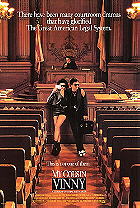 Posted : 16 years, 10 months ago on 16 July 2008 08:53
(A review of My Cousin Vinny)
Posted : 16 years, 10 months ago on 16 July 2008 08:53
(A review of My Cousin Vinny)"My Cousin Vinny" is not really a well known film but is worth watching out for. A very funny Joe Pesci has the time of his life in the lead role with excellent support from Marisa Tomei in an Oscar winning performance as his girl friend. This film is a complete change of pace for Pesci after his tough guy gangster roles in films such as "Goodfellas" and "Casino". Fred Gwynne was outstanding as Judge Haller in a well written role and his scenes in the courtroom with Joe Pesci were hilarious.
Favourite lines:
Mitchell Whitfield to Ralph Macchio: "Ridiculous, all this over a can of tuna!".
Fred Gwynne to Joe Pesci: "Once again the communication process is broken down".
Pesci to Gwynne: "You were serious about that?".
Pesci (to Marisa Tomei): "Thank you Miss Vito. No more questions. Thank you very, very much. You've been a lovely, lovely witness".
Directed by Jonathan Lynn and expertly acted this is one of the most delightful and funny courtroom comedies you will see in a long time. Highly recommended.
Favourite lines:
Mitchell Whitfield to Ralph Macchio: "Ridiculous, all this over a can of tuna!".
Fred Gwynne to Joe Pesci: "Once again the communication process is broken down".
Pesci to Gwynne: "You were serious about that?".
Pesci (to Marisa Tomei): "Thank you Miss Vito. No more questions. Thank you very, very much. You've been a lovely, lovely witness".
Directed by Jonathan Lynn and expertly acted this is one of the most delightful and funny courtroom comedies you will see in a long time. Highly recommended.
 0 comments, Reply to this entry
0 comments, Reply to this entry
TICK TOCK
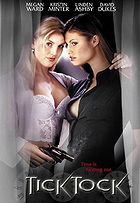 Posted : 16 years, 11 months ago on 16 July 2008 02:31
(A review of Tick Tock)
Posted : 16 years, 11 months ago on 16 July 2008 02:31
(A review of Tick Tock)If you are partial to a good thriller movie with many twists, turns and surprises along the way then you might be interested in "Tick Tock" (2000) expertly directed by Kevin Tenney who also wrote the script. I came across this film by accident recently on television and thoroughly enjoyed it. It is unlike any other Hollywood thriller you may have seen and holds your interest throughout. This is a gripping and provocative movie and I was very impressed by the unique and clever plotline whereby the action keeps going back in time! Two friends plan the "perfect murder" but things don't quite work out as they had hoped. Rachel and Carla plan to murder Rachel's wealthy husband for his money and enlist the help of cowboy Travis Brewer. They need him to help their dangerous and risky plan succeed but Travis has an agenda of his own so can he be trusted? The first rate cast gave outstanding performances although most of them were new faces to me. John Ratzenberger as Clay Fairfield (the private detective) was splendid and Kristin Minter was wonderful as the deceitful and scheming Carla. Linden Ashby is superb as Travis Brewer, the gullible cowboy seemingly helping the two girls with their dangerous plan - but is he? I can highly recommend this film if you are into suspense thrillers and watch out for the surprise ending!!
Favourite lines:
Linden Ashby to Megan Ward: "You don't want your husband to see these pictures is going to cost you $100,000".
Ward to Kristin Minter: "We're really going to get away with it aren't we?".
Ashby to Minter: "Look, I'm already a two time loser. If this thing backfires I spend the rest of my life in prison".
Favourite lines:
Linden Ashby to Megan Ward: "You don't want your husband to see these pictures is going to cost you $100,000".
Ward to Kristin Minter: "We're really going to get away with it aren't we?".
Ashby to Minter: "Look, I'm already a two time loser. If this thing backfires I spend the rest of my life in prison".
 0 comments, Reply to this entry
0 comments, Reply to this entry
THE JOLSON STORY
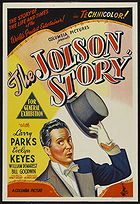 Posted : 16 years, 11 months ago on 16 July 2008 07:51
(A review of The Jolson Story)
Posted : 16 years, 11 months ago on 16 July 2008 07:51
(A review of The Jolson Story)"THE JOLSON STORY" is in my opinion probably the best musical biography ever to come out of Hollywood and LARRY PARKS was simply sensational in his amazing portrayal of Al Jolson which upgraded him overnight from being a routine Columbia B picture contract player to a star! However, it was a great shame that he made so few films following the two Jolson biopics due to the communist witch hunt which sadly brought his once promising screen career to an abrupt end. He was just one of many Hollywood actors whose careers were ruined by these investigations. James Cagney was actually the first choice to play Jolson in the film but he turned it down as did Danny Thomas and Gene Kelly. Jolson desperately wanted to play the leading role himself - and was opposed to another actor portraying his life. Unfortunately for him, the studio decided that he was obviously too old (he was 60 at the time of the first film) but Columbia couldn't have found anyone better than the younger Larry Parks (then 31) who perfectly captured the Jolson style and threw himself into the part with relish. However, Jolson did manage to play himself in one scene of "The Jolson Story" singing "Swanee" on the Winter Garden theatre runway (all filmed in long-shot with no close ups as that would have given the game away). A clip from this scene was also shown in "Jolson Sings Again" - so he did manage to appear in both films after all. When I first saw "The Jolson Story" I had never heard of its star Larry Parks although I had bought a few Jolson records prior to seeing the film. "The Jolson Story" is one of those rare movies that you can enjoy again and again and has a high place in my "top ten" films of all time. Jolson was often billed as "the world's greatest entertainer" and that is a title I am sure was well deserved. It is interesting to note that the storyline in "The Jolson Story" is not entirely accurate and took a few liberties with the facts. Jolson's mother had in fact died when he was only eight years old but in the film she lives on to see him become a big success on Broadway and in talking pictures. Surprisingly, many of the people who played active roles in Jolson's real life story don't even get a mention in the film versions, such as his long time manager Louis Epstein, his dresser valet Frank Holmes - and his brother Harry Jolson, who were all eliminated! The character of Steve Martin played by William Demarest did not actually exist and it has been suggested that this role was probably a composite of the three men referred to above, plus several other people. Jolson's first two wives were not even mentioned in "The Jolson Story" and Ruby Keeler (Jolson's third wife) would not allow her name to be used in the film so attractive Evelyn Keyes had to play the fictitious Julie Benson instead! Harry Cohn (the notorious head of Columbia Pictures) is to be congratulated for going ahead with Jolson's life story when so many of the other Hollywood studios had turned it down. Even Warner Bros. (for whom Jolson had starred in several films) were not interested. Filming was started on a small budget - and in black and white. When Harry Cohn saw the first rushes, he decided to film in colour and make "The Jolson Story" a major prestigious production. This certainly paid off for him in a big way as "The Jolson Story" became one of Columbia's top money earners - and led to a sequel "Jolson Sings Again" in 1949. Among all the numerous books written about Al Jolson I think you might enjoy "The Legend Comes to Life" by Herbert G. Goldman.
Favourite lines:
William Demarest: "Give that boy a spotlight!".
Tamara Shayne (to Ludwig Donath): "Papa, Asa isn't Asa any more!".
Larry Parks (to orchestra leader): "Oscar, what are you doing with that phone - this is no time to call up women!".
Parks (to audience in theatre): "Settle back folks - you ain't heard nothin' yet!"
This film is worth seeing just to hear the real Al Jolson belting out "California Here I Come", "Robert E. Lee", "Swanee", "Rockabye Your Baby", "About a Quarter to Nine", "You Made Me Love You", "I'm Sitting on Top of the World", "Mammy" and many of his other famous songs.
Favourite lines:
William Demarest: "Give that boy a spotlight!".
Tamara Shayne (to Ludwig Donath): "Papa, Asa isn't Asa any more!".
Larry Parks (to orchestra leader): "Oscar, what are you doing with that phone - this is no time to call up women!".
Parks (to audience in theatre): "Settle back folks - you ain't heard nothin' yet!"
This film is worth seeing just to hear the real Al Jolson belting out "California Here I Come", "Robert E. Lee", "Swanee", "Rockabye Your Baby", "About a Quarter to Nine", "You Made Me Love You", "I'm Sitting on Top of the World", "Mammy" and many of his other famous songs.
 0 comments, Reply to this entry
0 comments, Reply to this entry
 Login
Login
 Home
Home 30 Lists
30 Lists 41 Reviews
41 Reviews Collections
Collections